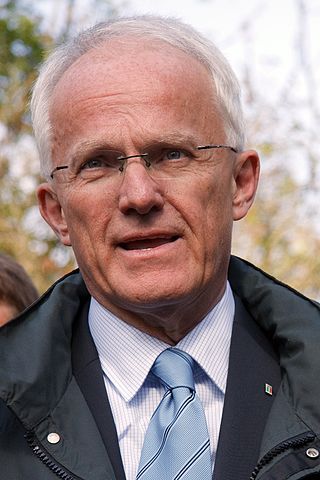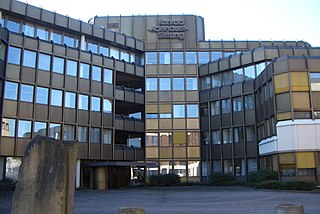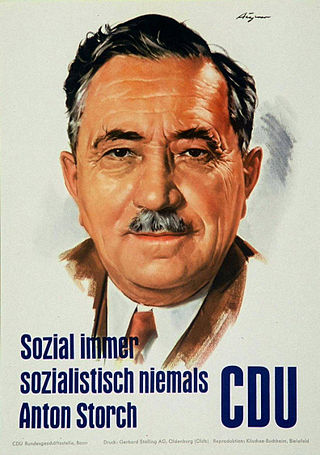
The Christian Democratic Union of Germany is a Christian democratic and liberal conservative political party in Germany. It is the major catch-all party of the centre-right in German politics.

Bernhard Vogel is a German politician of the Christian Democratic Union (CDU). He was the 4th Minister President of Rhineland-Palatinate from 1976 to 1988 and the 2nd Minister President of Thuringia from 1992 to 2003. He is the only person to have been head of two different German federal states and is the longest-governing Minister President of Germany. He served as the 28th and 40th President of the Bundesrat in 1976/77 and 1987/88.

Democratic Beginning was an East German political movement and political party that was active during the Revolutions of 1989 and in the period leading up to the German reunification. While it was a relatively minor party, it took part in the first democratically elected government in East Germany in 1990, and is especially known because future Chancellor of Germany, Angela Merkel started her political career within the party.

Norbert Blüm was a German politician who served as a federal legislator from North Rhine-Westphalia, chairman of the CDU North Rhine-Westphalia (1987–1999), and Minister of Labour and Social Affairs.

Jürgen Rüttgers is a German politician of the Christian Democratic Union (CDU) who served as the 9th Minister President of North Rhine-Westphalia from 2005 to 2010.

The Konrad Adenauer Foundation is a German political party foundation associated with but independent of the centre-right Christian Democratic Union (CDU). The foundation's headquarters are located in Sankt Augustin near Bonn, as well as in Berlin. Globally, the KAS has 78 offices and runs programs in over 100 countries. Its current chairman is the former President of the German parliament Deutscher Bundestag, Norbert Lammert. It is a member of the Martens Centre, the official foundation and think tank of the European People's Party (EPP). In 2020, it ranked 15th amongst think tanks globally.

Gerd Langguth was a professor of political science at the University of Bonn and the author of biographies of Angela Merkel, Horst Köhler and of Rudi Dutschke

Claudia Crawford is a German politician of the Christian Democratic Union (CDU), who became the youngest cabinet minister in German history whilst in office from 1994–98 and was Federal Minister for family, seniors, women and youth affairs and, by virtue of this office, presided over the European Union Council of Ministers. Nolte is a Catholic and is active in the Catholic community. She is married to investigative journalist David Crawford of CORRECT!V. With her marriage in July 2008, she took the name of her husband.

Anton Storch was a German trade unionist, politician, a member of the Christian Democratic Union (CDU) and the minister of labor from 1949 to 1957.

Hugo Hickmann was a German politician.
Ehrhart Neubert is a retired German Evangelical minister and theologian.
Helmut Alfred Brandt was a Berlin city councillor and a leading German politician in the Christian Democratic Union , a political party of the centre right.

Margarete Gröwel was a German teacher who became a politician. Later, in 1953, she became the first woman to serve in the German consular service in Houston.
Else Ackermann was a German physician and pharmacologist who became an East German politician. The report on the power relationships between the citizen and the state which she drafted, and in 1988 presented, known as the "Neuenhagen Letter", was a significant precursor to the changes of 1989 which led to the ending, in the early summer of 1990, of the one-party system, followed by German reunification later that same year.

The Leader of the Christian Democratic Union is the most senior political figure within the Christian Democratic Union of Germany. Since 31 January 2022, the office has been held by Friedrich Merz, who succeeded Armin Laschet.
Elisabeth Zillken was a German politician.

Ursula Männle is a German Social sciences academic and politician (CSU). She served between 1983 and 1994 as a member of the Bundestag. More recently, between 2000 and 2013, she was a member of the Bavarian Landtag, chairing an important parliamentary committee and, till 2009, chairing the women's working group in the Landtag.
Josef Stingl was a German politician who served as the longstanding president of the Bundesanstalt für Arbeit from 1968 to 1984. By that time he had already established himself as a national politician as a member of the CDU and, after he relocated to Munich, the CSU). From 1953 to 1968, he served as a member of the Bundestag. There, he took a particular interest in pensions and labour law.
Arnold Gohr was a German clerical worker who became a trade unionist and activist. After 1945 he entered mainstream politics in East Berlin. As the Soviet occupation zone evolved into a Soviet sponsored one-party dictatorship, he never joined the ruling party, remaining instead a leading "collaborationist" member of the eastern version of the Christian Democratic Union. He became a party chairman and served between 1948 and 1958 as "deputy lord mayor" of Berlin, a period during which the increasingly divided city's constitutional status and future were contentious and ambiguous on a number of different levels.
Märkische Union was a German newspaper, founded as the last CDU daily newspaper for Brandenburg, founded on February 3, 1948 with a license from SMAD. The news agency ADN reported the approval of the "occupying power" and named the newspaper title Märkische Union and Potsdam as the place of publication. The newspaper first appeared only three times a week. The then chairman of the CDU in the state of Brandenburg, Wilhelm Wolff, wrote in the first edition of the Märkische Union that Germany's unity remains the top priority.













